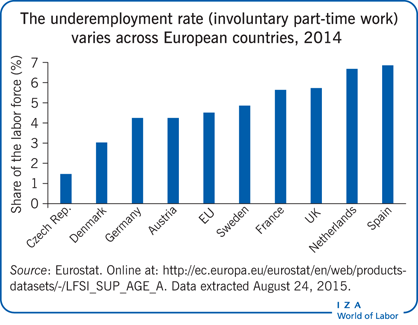Elevator pitch
A considerable share of the labor force consists of underemployed part-time workers: employed workers who, for various reasons, are unable to work as much as they would like to. Offering unemployment benefits to part-time unemployed workers is controversial. On the one hand, such benefits can strengthen incentives to take a part-time job rather than remain fully unemployed, thus raising the probability of obtaining at least some employment. On the other hand, these benefits weaken incentives for part-time workers to look for full-time employment. It is also difficult to distinguish people who work part-time by choice from those who do so involuntarily.

Key findings
Pros
Benefits to part-time unemployed workers strengthen incentives to take on part-time jobs.
Subsidized part-time employment can be a stepping stone toward unsubsidized employment.
Compared with many other systems, unemployment insurance for part-time workers seems to work well as an active labor market policy.
Unemployed workers who move into part-time jobs receive higher earnings, pay higher taxes, take less from the unemployment insurance system, and may receive fewer means-tested benefit transfers.
Cons
If part-time unemployment benefits are too generous, they create a risk for prolonged part-time unemployment spells.
Benefits to part-time unemployed workers weaken incentives to move into full-time employment.
Benefits to part-time unemployed workers could function as an unintended indirect subsidy to sectors with many involuntary part-time workers.
It is difficult for the government to distinguish people who are looking for full-time work from people who work part-time by choice.